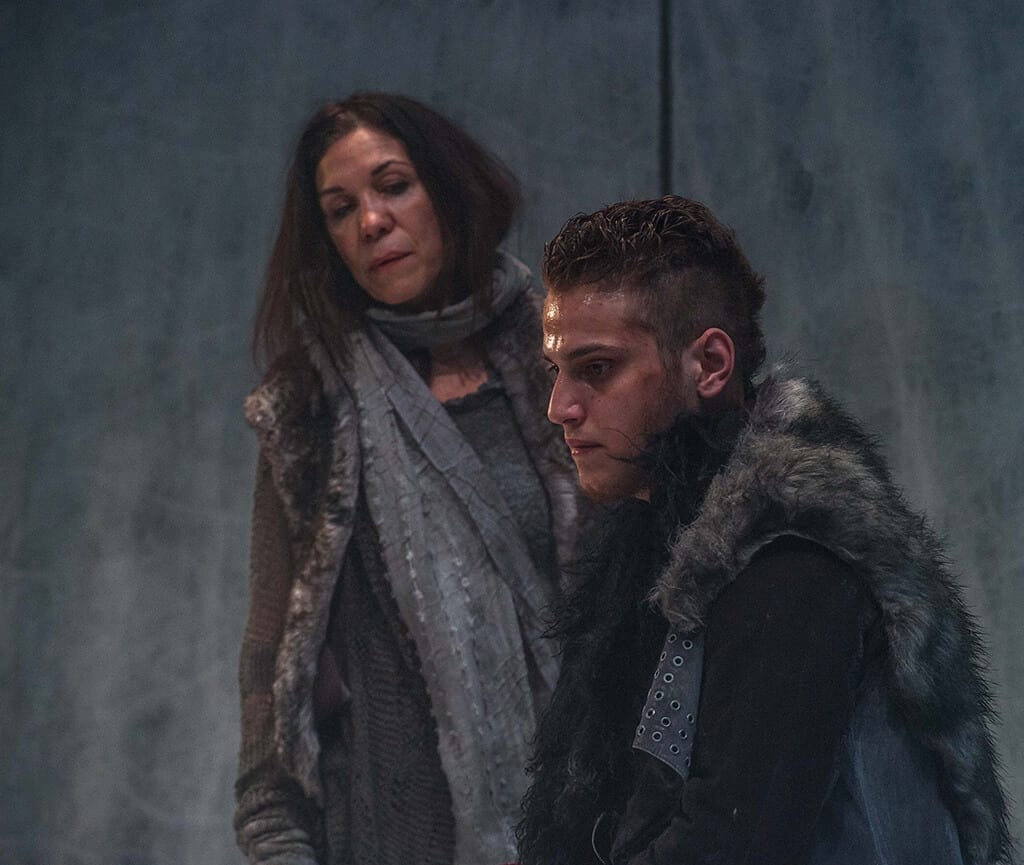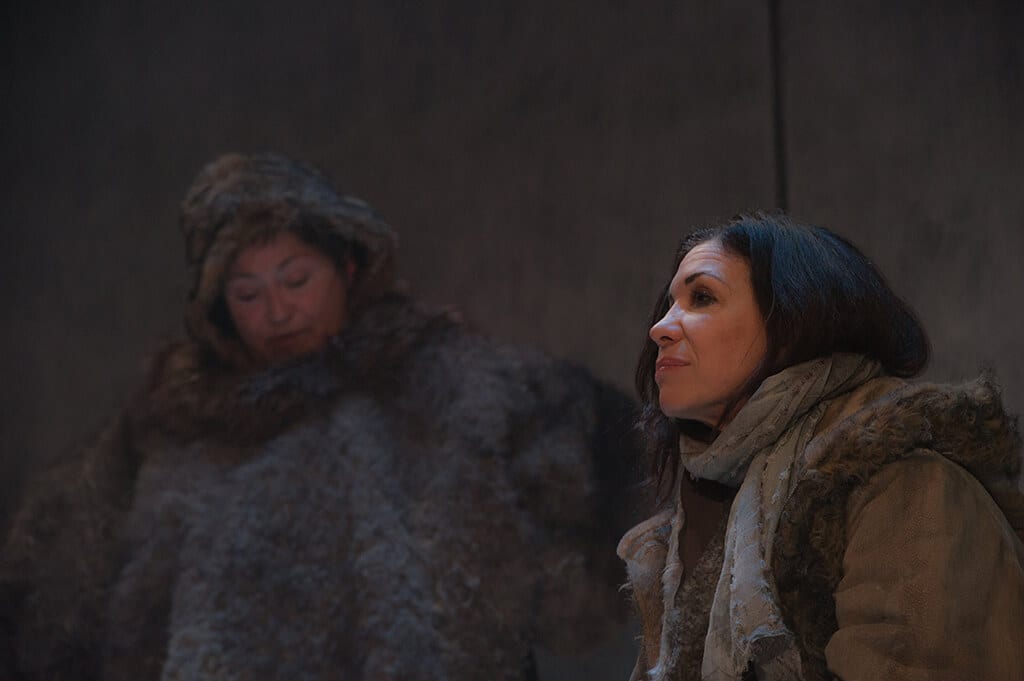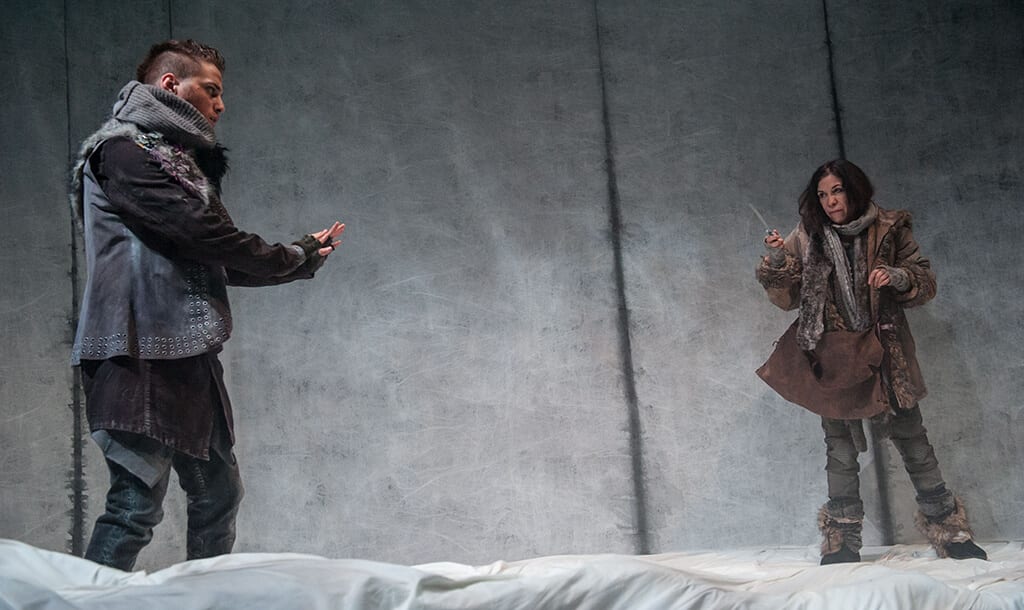The Unplugging, written by Algonquin playwright Yvette Nolan, is not a play driven by action. It’s about dialogue. Most importantly, it’s theatre that makes us think. And so, while I cannot recall any particular scene from last night’s performance that stood out in my mind, or any dramatic moment that left me speechless, I came away from the play with a feeling of intense satisfaction – with questions and concerns about the world in which we live.
So what did this rather short, 90-minute performance make us think about? What ideas did it play with? Well, there is the excessive dependence on technology in the modern era; the destruction of the environment; the obsession with consumerism; the conflict between the aspirations of the individual and the community; the treatment and perception of elderly women as undesirable and useless; the ongoing oppression of Indigenous women; and the forgetting of Indigenous knowledges.
Set in an imagined post-apocalyptic future, The Unplugging invites us into an unexpected landscape. There is no electricity, and the modern-day technologies that we so-often take for granted like Google and Twitter are no longer available. It is this dystopic setting that forms the background for the central narrative: a story about two Indigenous women — Bern (played by Allegra Fulton) and Elena (played by Diana Belshaw) — who have been forced out of a community that sees them as a burden, as too old to be of any value. This is “the unplugging,” and, as Bern quite rightly reminds us in the opening scene, you “can’t really stroll into the Canadian Tire” to find the tools necessary for survival.
But just as the women begin to adjust to their new environment (and we begin to sit comfortably on the sidelines), Bern and Elena’s utopian set-up is disrupted by the arrival of a young man of Irish origin named Seamus. The new narrative trajectory might seem like a bit of a cliché (the presence of a man ruptures the bonds between the women!), but like the play as a whole, there is much more depth here than we might initially expect. Seamus is not just any man; he’s a modern-day colonial figure. So when he takes off with Bern and Elena’s goods and with the knowledge he has acquired from them, his actions are unmistakably reminiscent of the appropriation of Indigenous land and culture by the dominant settler community in Canada.
In last night’s performance, the small cast of actors brought to the stage varying levels and abilities. Although Umed Amid has a promising future, he never quite played the role of Seamus with enough conviction. Fulton, as Bernadette, gave a good performance, even though she did not always manage to convey a range of emotions. Bern’s intimate interactions with Seamus in the bedroom, for instance, had so much potential, but the scene simply fell flat, and the shadowy curtain behind which it took place felt, well, a bit gimmicky. What Fulton brought to the stage was humor; she reached out to the audience, and she made us laugh. But more than Fulton, it was Diana Belshaw who gave a performance that we will remember for a long time. Playing the part of Elena, Belshaw’s passion and wit captivated the audience from beginning to end.
Although the set design of the play was simple, it worked. The white sheet that was draped over the stage created the impression of a bleak winter landscape. The dim lighting and the misty fog that enveloped the room at the outset of the play actually gave me a chill. The use of lighting and sound were, I would say, downright impressive. These elements worked to mark the passage of time and to signal very clearly the shift between scenes. What especially amazed me about the performance was that the actors never went off stage to change their costumes; instead, they removed layers of clothing on the stage itself. At one point, Bern’s scarf became a skirt.
While the play left me wanting more, I found myself feeling very uncomfortable when I learned that the actors playing the parts of Elena and Bern were not Indigenous. Diana Belshaw and Allegra Fulton are white women. For me, this is jarring. The Unplugging is a play, after all, that seems to be concerned about bringing the stories of Aboriginal women to centre stage. It is a play that is aware of the appropriation of Aboriginal cultures by white Canadian society. So I can’t help but wonder: why is this production reproducing the very reality that it has set out to undo?




